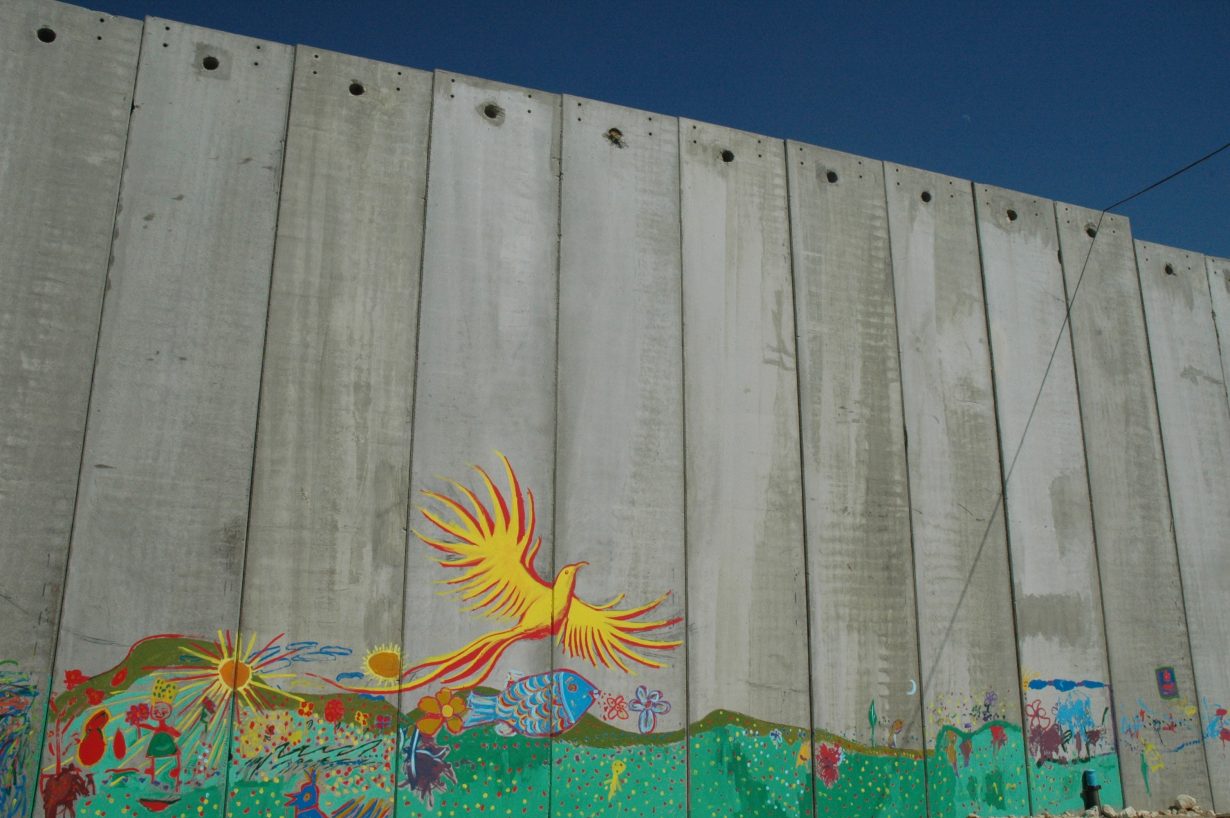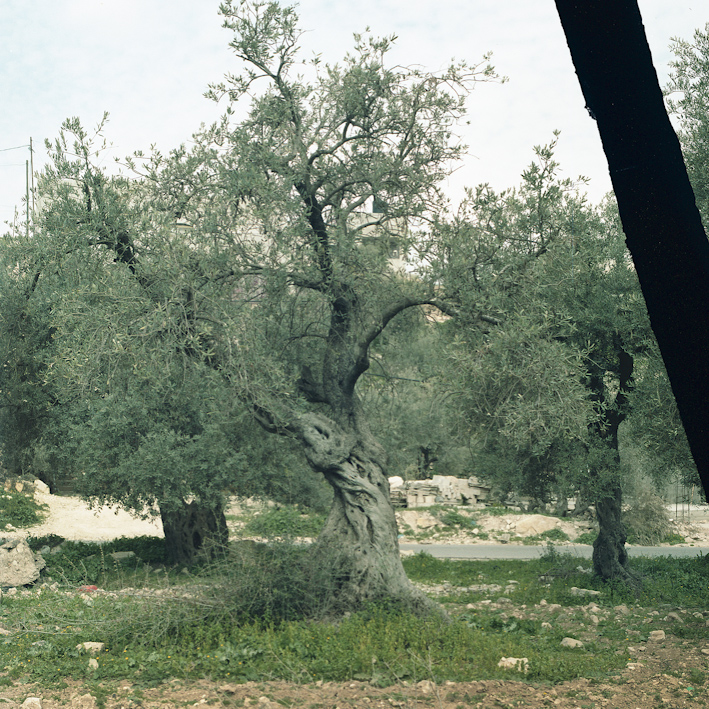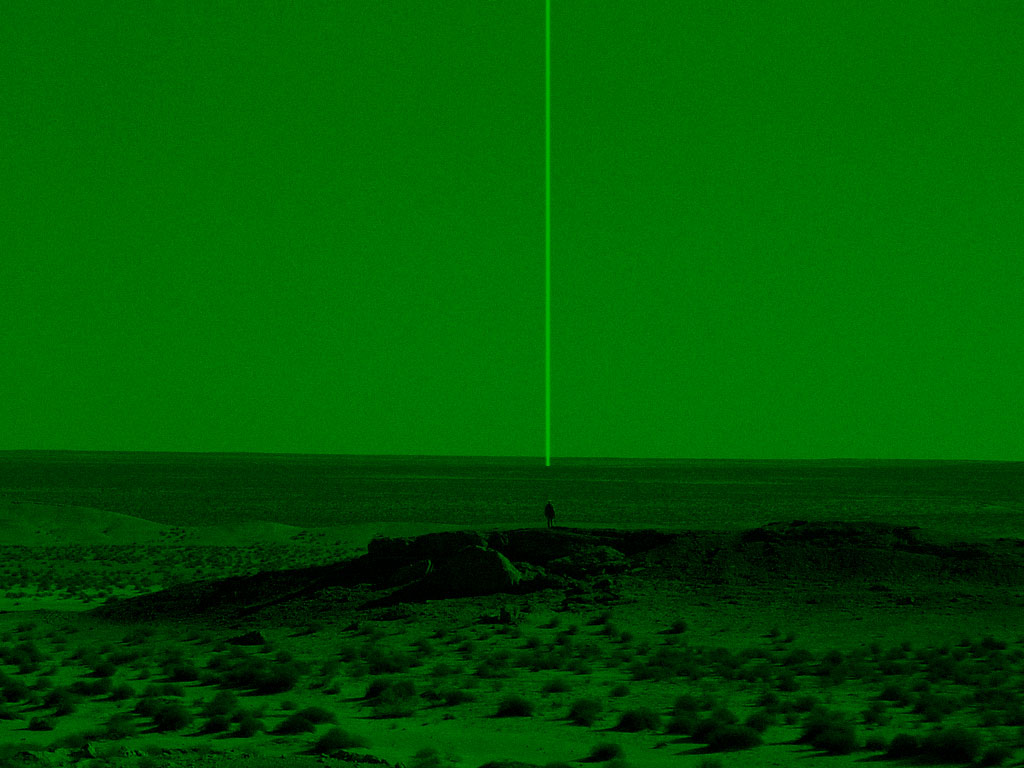After having their Schelling Architecture Foundation award rescinded for signing an open letter supporting the Israeli cultural boycott, the artist addresses the ‘duty of institutions to act ethically’
I live on a small island in Greece. On Sunday afternoon, I was sitting on the floor of my living room with my partner and our young son, picking over our most recent sackful of olives. We have a few dozen trees, and the last one we harvested this year yielded a few kilos of black and green fruit, some of them fat enough to preserve for eating, the rest destined for the press. On the wall above our heads hung a pair of photographs, taken by the artist Bryony Dunne, of ancient, gnarled olive trees in the West Bank. Due to a malfunction of Dunne’s camera, each image is slashed by a ragged black line. As we sorted the harvest into bowls, our fingers sticky with oil, I thought of all those who are unable to harvest their trees at this time, due to war, dislocation, dispossession and occupation. That world of pain, heartbreak and loss felt so far away from our little circle on the floor; and then I received an email, telling me exactly how it was all connected.
A few weeks ago, the German Bundestag passed a resolution which was intended to address the rise in reported incidents in antisemitism in the country. First proposed in the wake of Hamas’s 7 October attack on Israel, the resolution was the result of intense negotiations between the main political parties, and was highly controversial, attracting opposition from legal experts, civil-society groups and prominent Jewish intellectuals. The resolution effectively makes public grants for culture and science projects dependent on adherence to the International Holocaust Remembrance Alliance (IHRA) Working Definition of antisemitism: ‘The Bundestag reaffirms its decision to ensure that no organizations or projects that spread antisemitism, question Israel’s right to exist, call for a boycott of Israel or actively support the Boycott, Divestment, Sanctions (BDS) movement receive financial support.’
The resolution has been opposed from many quarters. A group of some 150 Jewish artists, writers and scholars living in Germany wrote an open letter expressing their ‘deep concerns’ about the planned resolution, saying that despite claiming to ‘protect Jewish life in Germany’, the resolution ‘promises to instead endanger it’ by ‘associating all Jews with the actions of the Israeli government, a notorious antisemitic trope’. Amnesty International Germany has stated that the resolution ‘not only fails to achieve [its] goal, but also raises fears of serious violations of fundamental human rights and legal uncertainty.’ In practice, the resolution has increasingly been used to silence, or attempt to silence, any criticism of Israel, in Germany and abroad, beyond even the definitions contained in the original publication. In Germany, the situation has been particularly acute.
This week, I discovered the implications of this resolution. In May, I was contacted by the Schelling Architecture Foundation, based in Karlsruhe, Germany, who told me that they had decided to award me their 2024 prize for Architecture Theory. On Sunday, just days before the awards ceremony (and days after announcing the award publicly), they emailed me to say they were rescinding the prize. The reason given was that I, alongside thousands of other writers, had signed an open letter pledging to boycott Israeli cultural institutions ‘that are complicit or have remained silent observers of the overwhelming oppression of Palestinians’.

Ironically, the book of mine which the jury cited as particularly deserving of recognition by the Prize – a book about technology, ecology and the way we think about intelligence (Ways of Being, 2022) – contains a discussion of Israel’s separation wall in the occupied West Bank. Noting how the IDF has been ordered to construct passages in the wall to allow certain animals – but not people – to pass through the wall, I wrote: ‘The spectacle of the Israeli Defense Forces creating grated passages through the apartheid wall to permit the passage of small mammals while continuing to degrade, suffocate and cut short Palestinian lives only serves to underscore the racism and inhumanity of such barriers, and the regimes which install them.’
It was the public letter, however, which had upset the committee. ‘The Schelling Foundation is faced with a profound and sensitive problem arising from its awareness of Germany’s national history and the responsibility this entails,’ they wrote. ‘Your signature under the call for a boycott of Israeli cultural institutions is in direct contradiction to this responsibility – and is the reason why we cannot award you the prize.’ ‘I am sure you are aware,’ they continued, ‘there has been an alarming increase in anti-Israel attitude – and anti-Semitism here in Germany. The German Bundestag has just passed a resolution on the protection of Jewish life, which points the way forward for state institutions and is relevant to society as a whole.’
I am not about to rehearse here the crucial, infinite difference between antisemitism and opposition to the State of Israel. Far better writers, thinkers and activists have said it all before. Nor am I about to repeat the reasons for my own position. They require no justification. You know as well as I do what is occurring: in Germany, in Israel, in Palestine, in Lebanon, in this world that we all share. Beyond that false and offensive equivalence, this form of words is eerily, devastatingly familiar. In her 1963 account of the Nazi mentality, ‘Eichmann in Jerusalem’, which gave us the phrase ‘the banality of evil’, Hannah Arendt wrote: ‘Much of the horribly painstaking thoroughness in the execution of the Final Solution – thoroughness that usually strikes the observer as typically German, or else as characteristic of the perfect bureaucrat – can be traced to the odd notion, indeed very common in Germany, that to be law-abiding means not merely to obey the laws but to act as though one were the legislator of the laws that one obeys.’
As a non-German citizen or resident, this state of affairs affects me far less than others. The Archive of Silence, an online, crowdsourced project, has been cataloguing some of the repercussions of the current atmosphere in Germany, documenting hundreds of occurrences in the last year alone. Artists including Jumana Manna, Emily Jacir, Candice Breitz, Johanna Hedva and Mohammed Al-Hawajri have had exhibitions cancelled because they made pro-Palestinian statements, or simply included Palestinian motifs in their work. Curators have been censured for merely ‘liking’ pro-Palestine posts online. Drawings by Palestinian children have been removed from view. The British-Palestinian doctor Ghassan Abu Sittah was denied entry into Germany when he attempted to give an eyewitness account of genocide. The list goes on.

The contemporary scholar Tobi Haslett has termed the current form of this reaction ‘hysterical obedience’, because what is notable about it is that these cancellations (actual cancellations, actual silencings of artists and others) have rarely been ordered directly by the state. The Bundestag’s resolution is not legally binding on private institutions. Rather, these acts are the result of individuals and organisations acting ‘as though one were the legislator of the laws that one obeys’.
I wrote repeatedly to those who corresponded with me from the Schelling Foundation – not to the Foundation, but to the individuals themselves. What is going on? I asked them. What are you doing? They responded: ‘We have forwarded your mail to our “Stiftungsrat” [supervisory board]’. This was a disturbing response from an organisation named in commemoration of an architect who was a longtime National Socialist Party member, who was a Sturmführer in the brownshirts, who designed Karlsruhe’s ‘Führer-Verlag’ publishing house, which produced Nazi propaganda newspapers.
I don’t believe the onus should be on artists to act better and more ethically than the well-funded institutions and organisations they depend upon. It is the duty of those institutions to act ethically – and actually to be aware of the work of those they offer funding to. However, the practical limitations of such a requirement have been made abundantly clear. It is artists who have often had to force institutions’ hands, such as in the campaign to remove Warren B. Kanders, whose company manufactures tear gas used at the US/Mexico border, from the board of the Whitney Museum in New York.
It is also impossible to separate causes and politics in the way that the Schelling Foundation, and other institutions, want to. The theme of this year’s prize was ‘Deep Transformations – Earth, Landscape, Architecture’. In their public statement announcing the rescinding of my prize, they wrote that my ‘publications on the complex relationships between society, technology and ecology have significantly enriched the current discourse’. They fail to understand, or choose to ignore, how my politics are of a piece with my philosophy. I write about the beauty, personhood, intelligence and vitality of all beings on this Earth. In Gaza and the West Bank, and now in Lebanon, they are burning the olive groves. Since 1967, an estimated 800,000 Palestinian olive trees have been destroyed in the West Bank and Gaza Strip by Israeli authorities and settlers. Genocide is ecocide; ecocide is genocide.

In January, a collective of artists and cultural workers launched Strike Germany, in response to the fact that German ‘cultural institutions operate with the understanding that in Germany there is no space for solidarity with Palestine, under threat of losing funding.’ The campaign calls for those cultural institutions to allow dissent, to focus the common fight on antisemitism rather than resistance to Israel, and to combat racism in all its forms. But the campaign recognised the far wider context in which it operated: ‘German post-reunification “remembrance culture” (Erinnerungskultur) – the state campaign to address Germany’s genocide of the Jews – acts as a repressive dogma, reinvigorating the oppression that real “remembrance” should work against. Rather than reckon with their own racist, increasingly neo-fascist politics, German media and politicians rush to blame Arab and Muslim populations in Germany for so-called “imported anti-semitism.”’ And where the German media and politicians go, the arts, all too often, seem to follow.
Germany is far from alone in this situation. The far right, and the denial of genocide that accompanies it, are on the march everywhere. But the logic of Strike Germany is simple: if it is illegal in Germany to call for cultural change in Israel, then it becomes necessary to call for cultural change in Germany itself. Late enough to be ashamed, but never too late, I sign my name.
James Bridle is a writer and artist
